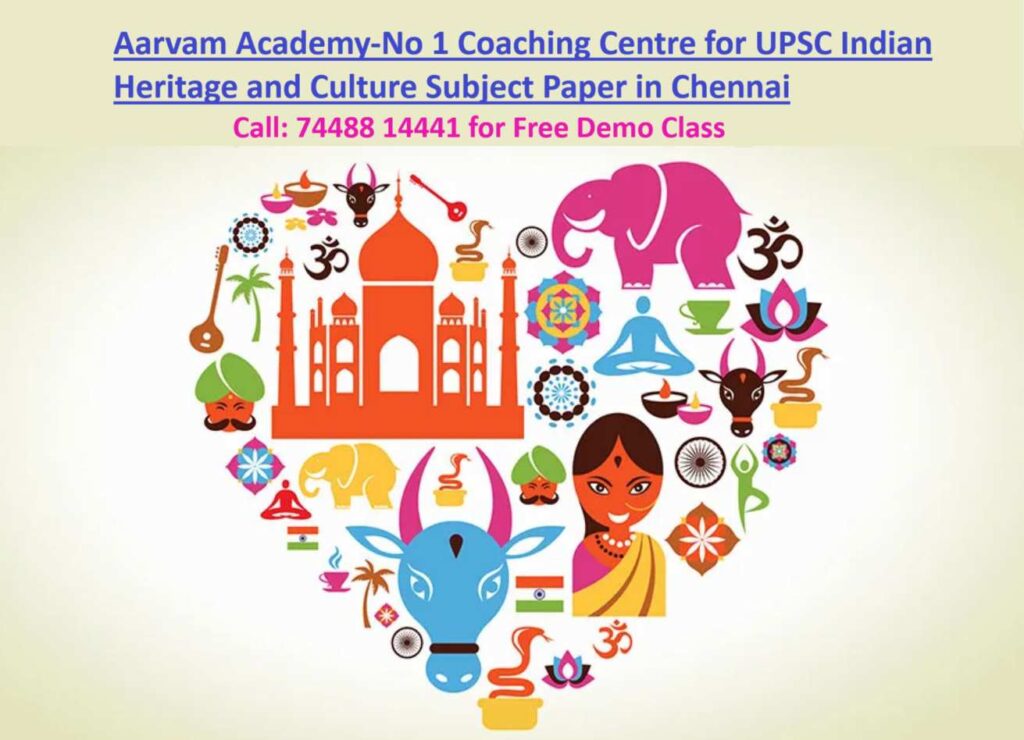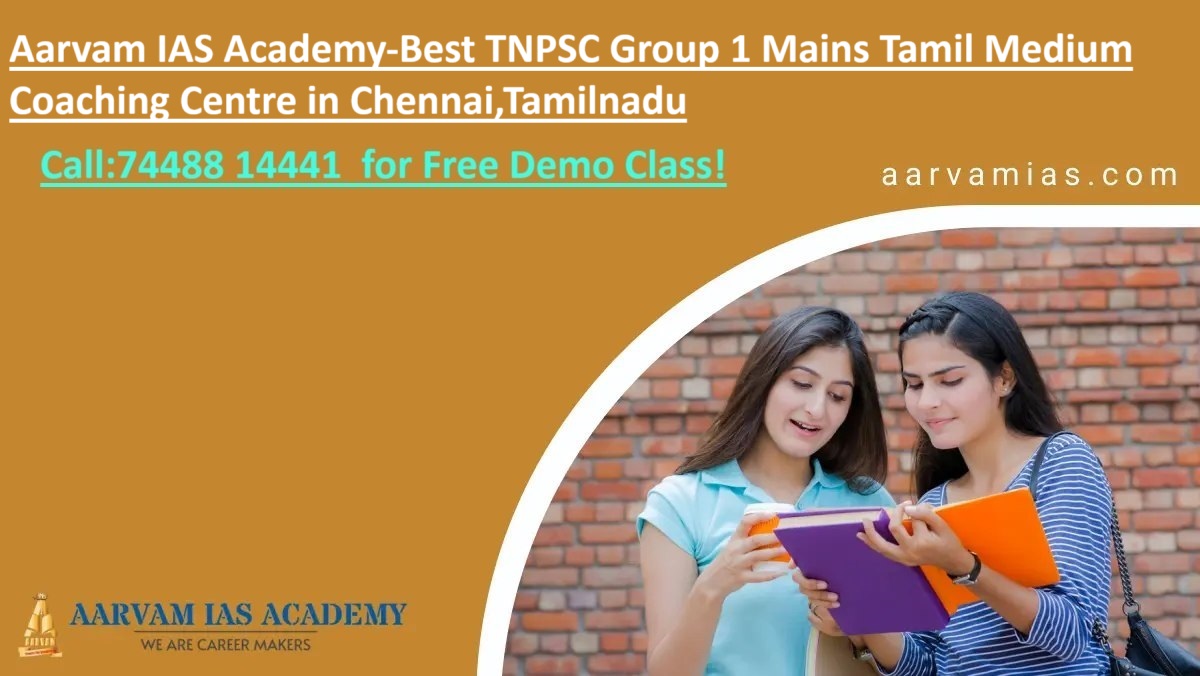Aarvam Academy-No 1 Coaching Centre for UPSC Indian Heritage and Culture Subject Paper in Chennai,Tamilnadu.Call: 74488 14441 for Free Demo Class.

Here are the top reasons why ,you should select Aarvam IAS Academy for your UPSC Indian Heritage and Culture Subject Paper Coaching.
1. Structured Preparation
- Full Curriculum: Aarvam Instructing services current a structured syllabus that covers all the matters and issues required for the UPSC examination.
- Nicely timed Completion: We help be sure that your full syllabus is roofed in a scientific and properly timed methodology, decreasing the prospects of missing out on important issues.
2. Expert Steering
- Expert Faculty: Our Instructing academy make use of expert faculty members who’ve in-depth data of the matters and the examination pattern.
- Personal Mentorship: Our Director Mr.Shibi Kumaran present personalised mentorship and steering, serving to faculty college students set up their strengths and weaknesses.
3. Top quality Look at Supplies
- Curated Property: We provide well-researched and up-to-date analysis supplies, along with notes, books, and observe papers.
- Centered Content material materials: The analysis supplies is notably designed to align with the UPSC syllabus and examination pattern, making the preparation additional focused and associated.
4. Frequent Assessments
- Mock Exams: Frequent mock checks simulate the exact examination setting, serving to faculty college students deal with their time efficiently and reduce examination nervousness.
- Effectivity Analysis: Detailed effectivity analysis after checks helps set up areas needing enchancment and monitor progress over time.
5. Peer Learning
- Aggressive Ambiance: Interacting with fellow aspirants presents a aggressive setting, motivating faculty college students to perform larger.
- Knowledge Sharing: Group analysis and discussions may assist in understanding completely totally different views and finding out new strategies.
6. Time Administration
- Mounted Schedule: A structured timetable provided by us will helps in disciplined and fixed preparation.
- Setting pleasant Use of Time: Steering on time administration helps faculty college students steadiness between completely totally different matters and totally different actions.
7. Entry to Property
- Library Facilities: We have libraries with in depth collections of books and reference provides.
- On-line Property: Entry to on-line lectures, e-books, and totally different digital sources can complement classroom finding out.
8. Current Affairs
- Every day Updates: We provide widespread updates on current affairs, which might be important for every the preliminary and main exams.
- Analysis and Discussions: Detailed analysis and discussions on current events help in rising a larger understanding of factors.
9. Interview Preparation
- Mock Interviews: Aarvam Academy normally conduct mock interviews to rearrange faculty college students for the persona check out stage of the UPSC examination.
- Ideas and Concepts: Expert options and suggestions on communication experience, physique language, and answering strategies can significantly improve effectivity.
10. Motivation and Help
- Motivational Durations: Frequent motivational courses and interactions with worthwhile candidates and specialists can enhance morale and maintain faculty college students focused.
- Stress Administration: We regularly current assist in managing stress and sustaining a optimistic mindset all by means of the preparation journey.
About UPSC Indian Heritage and Custom Matter Paper
The UPSC (Union Public Service Charge) Civil Suppliers Examination encompasses a paper on Indian Heritage and Custom as part of the Regular Analysis Paper I throughout the Mains examination. This subject focuses on India’s rich cultural heritage, historic previous, and essential components of Indian custom. Beneath is a high stage view of the essential factor areas lined beneath this subject and learn how to put collectively for it.
Key Areas Coated
- Indian Custom
- Salient components of Paintings Varieties: This consists of assorted classical and people dance sorts, music, theater, and totally different performing arts.
- Literature: Look at of historic, medieval, and fashionable Indian literature all through completely totally different languages and areas.
- Construction: Insights into completely totally different architectural sorts, essential constructions, and monuments from historic, medieval, and colonial situations.
- Indian Historic previous
- Historic India: Covers the Indus Valley Civilization, Vedic Age, Mauryan and Gupta Empires, and important historic events and figures.
- Medieval India: Examines the Delhi Sultanate, Mughal Empire, regional kingdoms, and cultural developments all through this period.
- Trendy India: Focuses on the colonial interval, freedom battle, and essential leaders and events leading to India’s independence.
- Submit-Independence Consolidation and Reorganization
- Key developments and insurance coverage insurance policies in India after gaining independence, socio-economic changes, and cultural evolution.
Preparation Technique
- Perceive the Syllabus:
- Familiarize your self with the detailed syllabus offered by UPSC. Break it down into smaller matters and create a complete examine plan.
- Customary Textbooks and Sources:
- NCERT Books: Begin with NCERT textbooks from Class VI to XII for a powerful basis.
- Cultural Books: Consult with books like “Indian Artwork and Tradition” by Nitin Singhania, which give detailed protection of the syllabus.
- Historical past Books: Books like “India’s Historical Previous” by R.S. Sharma, “A Historical past of Medieval India” by Satish Chandra, and “India’s Battle for Independence” by Bipan Chandra are essential.
- Present Affairs and Up to date Relevance:
- Keep up to date with present affairs associated to Indian heritage and tradition. Observe newspapers, magazines, and on-line portals for related articles and information.
- Notes and Revision:
- Make concise notes whereas finding out. Spotlight essential factors, dates, occasions, and figures. Common revision is crucial to retain data.
- Apply Earlier Years’ Query Papers:
- Fixing earlier years’ query papers helps in understanding the sample and varieties of questions requested. It additionally aids in time administration and reply writing apply.
- Use On-line Sources:
- Numerous on-line platforms and sources present beneficial data and examine materials. Web sites like PIB (Press Info Bureau), CCRT (Centre for Cultural Sources and Coaching), and NIOS (Nationwide Institute of Open Education) supply detailed content material on Indian heritage and tradition.
Recommended Books and Resources
- NCERT History Textbooks (Class VI to XII):
- Basic foundation for ancient, medieval, and modern Indian history.
- “Indian Art and Culture” by Nitin Singhania:
- Comprehensive coverage of Indian art forms, literature, and architecture.
- “India’s Ancient Past” by R.S. Sharma:
- Detailed information on ancient Indian history.
- “A History of Medieval India” by Satish Chandra:
- In-depth coverage of medieval Indian history.
- “India’s Struggle for Independence” by Bipan Chandra:
- Crucial for understanding modern Indian history and the freedom struggle.
- “Facets of Indian Culture” by Spectrum:
- A good supplementary book for cultural aspects.
Important Topics to Focus On
- Indus Valley Civilization: Town planning, architecture, and cultural aspects.
- Vedic Age: Society, economy, religion, and literature.
- Buddhism and Jainism: Origins, teachings, and impact.
- Mauryan and Gupta Empires: Administration, economy, art, and literature.
- Delhi Sultanate and Mughal Empire: Political history, cultural contributions, and significant rulers.
- Bhakti and Sufi Movements: Philosophies, major saints, and their influence on Indian society.
- Colonial Period: Impact of British rule on Indian society, economy, and culture.
- Freedom Struggle: Key events, movements, and leaders.
- Post-Independence Developments: Major cultural policies, institutions, and initiatives.
By systematically covering these areas and utilizing the right resources, aspirants can effectively prepare for the Indian Heritage and Culture section of the UPSC exam. Regular practice, revision, and staying updated with current cultural developments are key to excelling in this subject.










